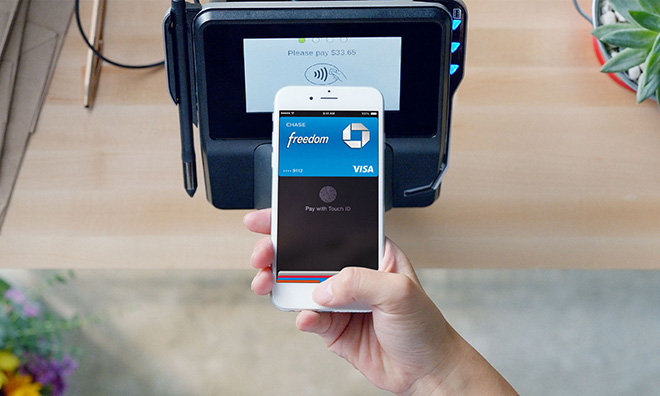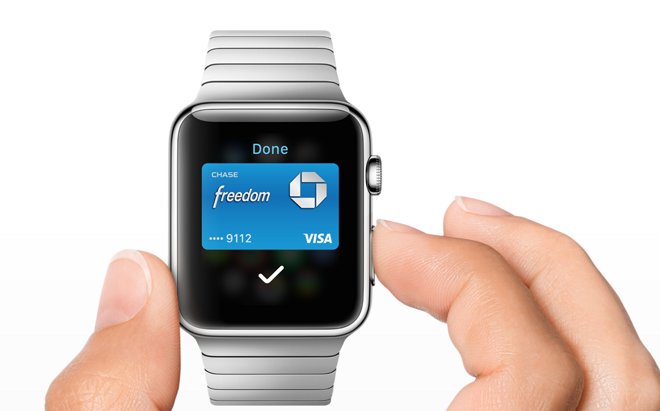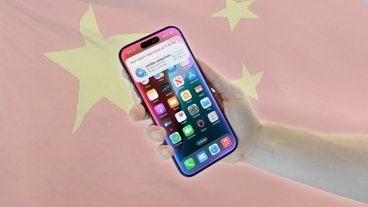According to market research firm InfoScout, some six percent of iPhone 6 and 6 Plus owners have used Apple Pay to make a touchless transaction, while 85 percent have yet to try the service.
InfoScout announced its findings at the PYMNTS.com Mobile Innovation Project 2015 conference on Wednesday, with Venture Beat reporting adoption of Apple's NFC-based mobile payments system is moving "very slowly."
Aside from the six percent who used or continue to use Apple's iPhone-based NFC payment solution, 85 percent of iPhone 6 owners have not even played with the service. Another nine percent said they experimented with Apple Pay, but forgot how to use it when making a purchase or didn't know where it was accepted. Since Apple Pay launched in October, however, there have been a number of how-to articles published covering setup and management, including AppleInsider's step-by-step guide.
Statistics were based on a three-day survey taken last week involving 1,188 participants. It was not made clear whether data includes adoption statistics for Apple Pay's in-app payment functionality, available on iPhone 6, iPad Air 2 and iPad mini 3, but the report's language suggests only information regarding in-store transactions was counted.
When discussing reasons as to why consumers have not yet used Apple Pay, the report muddles the data. Instead of distinguishing customers who are satisfied with their current payment method and those who do not understand how Apple Pay works, the two classes are lumped together.
One thing that is clear, however, is a current hardware limitation to Apple Pay's growth model.
"Not only do you have to have consumers with Apple Pay, you have to have consumers with iPhone 6," said PYMNTS CEO Karen Webster. "So, you have to have a consumer with the right hardware and the merchant with the right hardware in order for it to work."
Apple is addressing this concern in part with Apple Watch. When the device debuts in April, it will not only serve as a client-side Apple Pay terminal for iPhone 6, but also as a go-between for Apple devices that lack NFC chips, like iPhone 5, 5s and 5c.
Perhaps more important than hardware availability is customer loyalty. The study found 30 percent of respondents who already use Apple Pay base their shopping choices on whether a store supports Apple's service. If the number of consumers actively seeking out Apple Pay-compatible locations grows, retailers may feel pressure to jump on board, thus expanding the service's footprint.
In addition, survey participants shrugged off recent media reports of security concerns and most hold a view that Apple Pay is easy to use and safe, the report said.
Apple is slowly adding to a running list of merchants that support Apple Pay and recently announced 14 new partners including Jamba Juice and Office Max, making it more enticing for those who have yet to adopt.
Additionally, the number of financial institutions participating in Apple Pay is steadily increasing. Just yesterday, Apple updated added another 39 banks and credit unions, bringing the total to almost 150 partners across the U.S., with another 700 awaiting authorization.
 AppleInsider Staff
AppleInsider Staff








-m.jpg)






 Charles Martin
Charles Martin
 Christine McKee
Christine McKee
 Wesley Hilliard
Wesley Hilliard
 Malcolm Owen
Malcolm Owen
 Andrew Orr
Andrew Orr
 William Gallagher
William Gallagher
 Sponsored Content
Sponsored Content








92 Comments
Go live in Australia and it will be used heavily. The payment system is already set up for it. Also the article doesn't make clear that their are real limits to adoption when most of the US payment hardware isn't up to it. Unlike Austrrlaia where the terminal hardware is already widely adopted. And Europe too.
Also the article doesn't make clear that their are real limits to adoption when most of the US payment hardware isn't up to it.
It's the same story as always: merchants hate credit card companies and treat cash registers as a money sink, not a opportunity. We're 7 months out from our EMV/chip card deadline. Cards have been reissued, terminals installed but not enabled, and absolutely nobody knows how to use it. Exactly one major merchant, Wal-Mart, has switched over. There has been absolutely zero PR or social awareness.
I bet if they compared Apple Pay with Chip Card, they'd find Apple Pay is way ahead.
I know a lot of iPhone 6 series owners that have yet to use it, many without having setup a card. Personally, I used twice just today which was for 66% of the transactions I made (although I still used my iPhone 6 at the Starbucks for payment so I'm not sure if that should be tossed out since it's not a typical transaction type). One of them was me forgetting to bring in my wallet from the car when hitting the grocery store after the gym, but I noticed they had the newer EMV/Chip and PIN reader so I gave it a shot and it worked. No NFC symbol on the card readers from either place I used it, which I thought was strange. They were Verifone EMV readers, which seems to mostly also have NFC HW.
I would use ApplePay all the time, if I could find a store that supported it. The only places I have seen ApplePay supported in Texas is Panera and some McDonalds. Every other retailer has the terminals that support it, but do not accept ApplePay.
Does this survey include use of the iPhone 6 at NFC terminals in stores regardless of whether they're formal ApplePay partners or not? If it does not, it's a rather limited -- I dare say, pointless -- data gathering exercise.